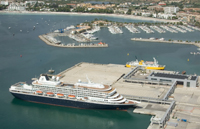
APB offers maximum rebates to cruise ships calling at the ports of Maó and Alcudia
Palma de Mallorca
28/08/2014
The APB, in its 2015 Business Plan, which has been agreed with the State-owned Ports Body, has adopted the maximum rebate legally permitted for cruise ships calling at the ports of Maó and Alcudia, in order to promote cruise traffic and contribute to the economic and social development of these islands. Accordingly, as of the first of January 2015, cruise ships calling at these two ports will benefit from a 40% rebate on both the vessel and passenger charges.
According to the APB Chairman, Alberto Pons, this measure responds to the authority´s commitment to promote these two destinations, given the tourism and logistics opportunities they offer. “We have to make sure that shipping companies don’t object to working with us for economic reasons”, said Pons, who was confident that these companies would take into account the efforts made by the APB in terms of charge rebates for 2015.
Reduced charges
With the same objective in mind, the APB has also decided to apply a 20% rebate on the vessel, passenger, and goods charges for regular goods and passenger traffic at the Port of Maó in 2015. According to the APB, maritime traffic to and from the Minorcan port is highly strategic and it has included this rebate to make it more competitive.
In 2015, the APB will be maintaining the reductions it has already applied this year at all the public interest ports it manages, consisting of a 30% rebate on the passenger charge, and a 10% rebate on the goods charge, aimed at boosting economic activity on the islands.
In addition, the APB applies the maximum rebate legally permitted as an island group on charges for shipping services to and from other ports outside the archipelago. These reductions consist of a 40% rebate on the vessel and goods charges, a 45% rebate on the passenger charge, and a 60% rebate for vehicles transported as goods.
All these measures will be presented to the APB’s Board of Directors for endorsement, and their subsequent approval in the 2015 General State Budget Law.







